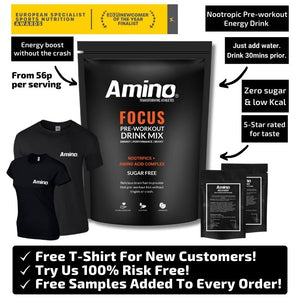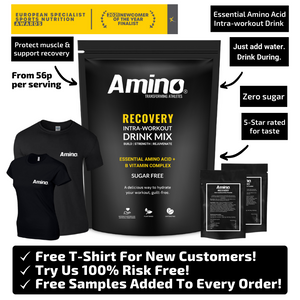There's a lot of debate within the fitness community as to whether or not EAA supplements are effective, with some even adamant that "amino acids don't work" and calling them a "waste of money." So, what's the truth? Do EAA supplements actually work? Let's take a look at the science behind these popular supplements to find out.

As with most things in life, there is no one-size-fits-all approach to nutrition and fitness because everyone's situation, body type, and goals are different. What works for you won’t necessarily work for someone else.
Although knowledge and science are easy to find online, applying them in the real world can be more difficult. We want you to have all the information possible so that you can make an educated decision, which is why we aim for our articles to provide both facts and different points of view.
So let's get into it….
What is an EAA supplement?
First, we need to clear up what an EAA supplement actually is. This will help you understand the role it plays in your body and why some athletes see big benefits from taking them regularly.
An EAA supplement, or Essential Amino Acid supplement, is a type of sports nutrition supplement that most commonly used to help athletes and bodybuilders improve their performance and muscle growth. These supplements usually come in powder form, and contain a blend of essential amino acids that the body needs in order to function properly.
The term "essential" amino acids (EAAs) refers to a group of amino acids that must be consumed on a regular basis because they cannot be manufactured in the body and, as such, must be ingested daily. Proteins are composed of amino acids (building blocks), which are found in all living
Humans are made up of 21 amino acids (depending on who you ask, see image below), but there are many more in the natural world. Of the 21 amino acids, 9 are "essential" amino acids. The other 12 can also be obtained from your diet but your body can make these from the 9 EAAs.
Each amino acid has a primary function, as well as multiple supporting roles. As such, each one is unique. They are critical for a healthy body.
When consumed, protein is broken down into amino acids in your digestive system. These can then be used by the body – but there is no way for the body to store protein or amino acids. That’s why it’s important to regularly consume protein.

Related: What are amino acids and why do we need them?
What do eaa supplements contain?
An EAA supplement, as the name suggests, is composed from the specific amino acids that are considered essential. In the world of EAA supplements, there are three distinct types of EAA supplements.
- Full-spectrum EAA supplements - EAA supplements that are made up of all nine essential EAAs mixed together, sometimes with additional nutrients.
- Branch chain amino acid (BCAA) supplement - Amongst the 9 EAAs, three are particularly well-known and called the BCAAs: Leucine, Valine, and Isoleucine - these BCAAs are used in supplements at varying dosages. It's worth noting that although BCAAs are EAAs, but not all EAA s are BCAAs.
- Single amino acid supplements - EAA supplements that contain one or more of the nine EAAs (or a subset thereof) isolated from other amino acids e.g: L-Leucine which is the most common and best-studied amino acid for recovery and muscle growth – it is usually one of the first ingredients you will see on an eaa supplement label.
Do EAA supplements work?
In short, yes. Essential amino acids are important in all bodily processes. If you’re alive and reading this, you will need amino acids to survive!
To say that they don’t work is a ludicrous statement; your body is consuming, manufacturing and using them all the time to stay alive. This is a key counter-argument for trolls.
And while most of the amino acids you need should be obtained from your diet, free-form amino acid supplements can also be used at specific times in specific situations. For instance, to give athletes or people with certain health disorders particular benefits.
Studies show EAA supplements can help with muscle growth and strength gains when taken pre-workout or intra workout, but that is not to say they will work for everyone. It depends on your goals and fitness abilities.
If you're looking for lean muscle and strength gains in the gym, amino acid supplements can be very beneficial. But if your goal is just to stay active and healthy, then supplements may not offer much extra help.
Related: Top 10 Benefits of EAAs
Supplements are not a substitute for optimal nutrition and protein consumption. It’s a supplement to a good diet. Supplements can be very powerful and helpful in real-world situations when perfect dietary conditions are not possible.
With more 300,000 Google Scholar articles exploring the effects of amino acid supplements during exercise, there are lots of arguments for and against. The real questions are 'why are you using them and what is your goal?'.

Why would someone say that "EAA supplements don’t work?"
1) BCAAs vs EAAs
There is a group of amino acids called BCAAs, these are 3 of the 9 essential amino acids. BCAAs are the most popular and most widely distributed amino acid supplement on the sports nutrition market. They have played a large role in the bodybuilding community in the past. As a result, they have made their way into the mainstream in recent years.
People who aren’t in the know will assume that BCAAs are synonymous with all amino acids and vice versa – not that they make up only 3 of the 21 that your body needs.
BCAAs became popular because the evidence in the 80s and 90s showed that they switch on muscle protein synthesis and tell the muscle to repair itself. This science is still true; BCAAs do play a role in switching on our muscle cells for repair, especially leucine. But the most up-to-date evidence shows that this process is not as effective when BCAAs aren’t supported by the other six EAAs.
This means that people who have done some limited research call out amino acids, saying they are ineffective. What they actually mean is that the BCAAs are not as effective at switching on and sustaining the repair process as essential amino acids, or a complete protein source.
Related: BCAA vs EAA: Which is better and why?

2) You need more than just an EAA supplement to build bigger muscles
A second factor is that the majority of people who claim amino acids don’t work are focused on building muscle and bodybuilding. Their focus is to grow as large as possible.
From scientific research, we know the main way to grow is to increase your calorie intake from food. Using a BCAA supplement, which is low in calories, doesn’t appear to support their particular goal (although it will help to stimulate protein synthesis). There may be better ways to achieve their goal, like mass gainer shakes.
However, just because it doesn’t necessarily help their main goal, they think that it must be the case for every athlete. This is far from the truth.
They need to consider that there are multiple goals, such as getting leaner, supporting health and improving performance. Amino acids can play a role in each of these. Let us be clear: it’s not just about growth, size and building muscle. Only a small (but noisy) group of people want this outcome.
Only a small percentage of athletes can eat 6 protein-focused meals throughout the day while getting optimal hydration and sleep. It's unrealistic to assume that this is normal and that the average gym-goer wants to achieve those goals.
Related: EAA vs Whey Protein: Which one is right for me?
3) You can get EAAs from the protein you eat
EAAs are obtained from the protein you eat. Protein is made up of amino acids, which are the building blocks of muscle. Therefore, eating a diet that is high in protein can help to improve your muscle growth and performance. So why do I need to supplement?
Well, if you're an athlete who frequently does high-volume or high-intensity workouts, your protein requirements are significantly higher. And whilst a diet high in protein should be your primary focus you may be able to reach your goals faster with a more targeted approach. This is where supplements can be very powerful and helpful in real-world situations when perfect dietary conditions are not possible.
Conclusion
In conclusion, amino acids and EAA supplements work. The 21 amino acids in our bodies all have a specific function in sustaining a healthy lifestyle.
We want to get most of our amino acids from a healthy, balanced diet. Because they can’t be stored, we have to eat protein regularly.
On top of this consistent intake of protein, free-form amino acid supplements (alongside any supplement that science proves works) can be used at specific times to give the desired effect. As such, EAAs can be a very powerful intra-workout tool.
In certain cases, these needs must be supported even more e.g vegans, elite athletics, dietary restrictions, where extra amino acids must be consumed.
Supplements are not a replacement for good nutrition and diet. They are meant to support a particular goal. There is no magic bullet. You will see more results by improving your diet in the first instance, before choosing a supplement.
EAA supplements are not needed by everyone. However, they can be an effective tool for optimising specific fitness goals for certain individuals when used properly.
The key is to understand individual athletes and their needs. Don’t just throw out blanket dogmatic ideas based on what works for you. Learn first and apply second.
We hope this helps. Got a question email info@drinkamino.com and we will get back to you.
ENJOYED THIS ARTICLE?
Find out more about how amino acid supplements can help to support a healthy lifestyle, plus get 10% off your first Amino order.






